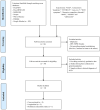Narrative Review of COVID-19 Impact on Obsessive-Compulsive Disorder in Child, Adolescent and Adult Clinical Populations
- PMID: 34054624
- PMCID: PMC8158808
- DOI: 10.3389/fpsyt.2021.673161
Narrative Review of COVID-19 Impact on Obsessive-Compulsive Disorder in Child, Adolescent and Adult Clinical Populations
Abstract
Background: The COVID-19 pandemic and quarantine had a significant impact on mental health which resulted in an increase of anxiety and depression in adult, child and adolescent clinical populations. Less is known about the potential effect of pandemic on obsessive-compulsive disorder (OCD) so there is a lack of review work to illustrate the impact of the COVID-19 pandemic on OCD. Purpose: The main objective is to review all the empirical contributions published after March 2020 that dealt with the impact of the COVID-19 pandemic on OCD in adults, children and adolescents, investigating the state-of-the-art literature concerning the impact on OCD and detailing limitations. Methods: The literature search was conducted using PsycINFO, PsycARTICLES, MEDLINE, Scopus, Web of Science, PubMed, and Google Scholar. This review analyzed all studies from January 2020 to 8 January 2021, focusing on clinical populations of children, adolescents, and adults with OCD. Results: A total of 102 articles were screened, resulting in the identification of 64 full-text articles to be further scrutinized. Upon closer examination, there was consensus that 39 articles met the study inclusion criteria and 14 of these were selected for study. Analysis of the results revealed that COVID-19 had an impact on OCD in both adults and young people and seems to have caused exacerbation of symptoms, especially of the contamination/washing subtypes. Eight studies in adult samples showed an increase in the severity of obsessive-compulsive symptoms; two studies underlined a minimal impact of COVID-19 on OCD patients and one study showed a slight improvement in symptoms. Two out of three studies on children and adolescents showed an exacerbation of OCD and a worsening even in the presence of an ongoing treatment. Conclusions: The studies reviewed are few. There are more studies on adult OCD than on children and adolescents. The results are controversial: few studies examined OCD subtypes; in most studies the typology of treatment was not clear and the samples covered a wide age range; a large number of studies did not use the same monitoring period or quantitative measures, both of which make it difficult to compare or rely on the results.
Keywords: COVID-19; adolescents; adults; children; coronavirus; narrative review; obsessive-compulsive disorder; obsessive-compulsive symptoms.
Copyright © 2021 Zaccari, D'Arienzo, Caiazzo, Magno, Amico and Mancini.
Conflict of interest statement
The authors declare that the research was conducted in the absence of any commercial or financial relationships that could be construed as a potential conflict of interest.
Figures


References
-
- Giallonardo V, Sampogna G, Del Vecchio V, Luciano M, Albert U, Carmassi, et al. . The impact of quarantine and physical distancing following COVID-19 on mental health: study protocol of a multicentric Italian population trial. Front Psychiatry. (2020) 11:533. 10.3389/fpsyt.2020.00533 - DOI - PMC - PubMed
Publication types
LinkOut - more resources
Full Text Sources
Other Literature Sources
Miscellaneous

